8 Africa
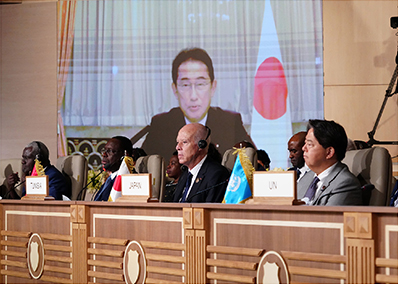
Prime Minister Kishida delivering a speech via video call and Foreign Minister Hayashi attending in person as a Special Envoy of the Prime Minister, at the opening session of the Eighth Tokyo International Conference on African Development (TICAD 8), held in Tunisia (August 2022)
Africa, which is expected to account for a quarter of the world’s population by 2050, is a young and hopeful continent with great potential for dynamic growth. However, it also faces various challenges including poverty, fragile health systems, and emerging terrorism and violent extremism. In order to tackle these challenges, African countries work on sustainable development based on “Agenda 2063,” Note 24 Africa’s own new development initiative. In a series of movements that continue to threaten the foundation of the international community, with Russia’s aggression against Ukraine as a flagrant example, it becomes more important than ever for the international community to respond in union. Africa’s position in the international community is accordingly growing, and it is necessary to further promote cooperation with African countries.
● Japan’s Efforts
Japan has contributed to Africa’s development over many years, including through the Tokyo International Conference on African Development (TICAD). Glossary At TICAD 8, held in August 2022 in Tunisia, Prime Minister Kishida made statements online in all sessions, and Foreign Minister Hayashi participated in person as a Special Envoy of the Prime Minister. Taking the opportunity of TICAD, Prime Minister Kishida had bilateral talks with a total of 10 countries and organizations, including President of Tunisia Saied, President of Senegal Sall, and African Union Commission (AUC) Chairperson Faki, and Foreign Minister Hayashi held bilateral talks with 21 countries, including eight heads of state and government. These meetings covered discussions on Russia’s aggression against Ukraine and opaque and unfair development finance, in addition to bilateral relations. The various meetings also confirmed cooperation between Japan and African countries in the international arena, too, on issues such as early recovery from the COVID-19 pandemic, food security, the North Korean issue, and UN Security Council reform.
Japan also announced at TICAD 8 that over the next three years it will put in 30 billion US dollars as the sum of public and private financial contribution, with an emphasis on “investment in people” and “quality of growth,” engaging in green investment, promotion of investment, development finance, public health, human resources development, regional stabilization, and food security. In terms of human resources development, Japan aims to train more than 300,000 professionals in a wide range of fields that include industry, health, medicine, education, agriculture, justice, and administration. As “a partner growing together with Africa,” Japan aims to promote African development with people-focused approaches that are quintessentially Japanese, and to realize a resilient Africa that Africa itself aims to achieve (see “ODA Topics” regarding TICAD 8).
■ Economy
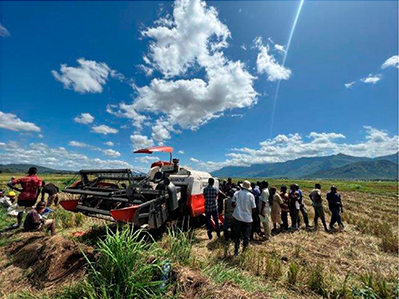
Farmers in Mombo, Tanga region, learning how to operate combine harvesters in agricultural machine training implemented under “Data Collection Survey on Strengthening of Training System and Promoting Rice Cultivation Package in the United Republic of Tanzania” (Photo: JICA)
At TICAD 8, Japan announced that it will strengthen a free and open international economic system to “build back better” from the COVID-19 pandemic and the Ukraine crisis in order to safeguard people’s livelihoods. Japan also announced that it would support green growth in the respective countries toward achieving a resilient and sustainable Africa, and bolster private and start-up companies expanding into Africa with a focus on vibrant and dynamic young people.
To date, as “investment in people” toward the realization of quality growth, Japan has developed industrial human resources who contribute to the promotion of businesses. Under the ABE Initiative, Note 25 Japan has provided training opportunities to approximately 2,000 young Africans through JICA. In addition to industrial human resources, Japan also helps to train ICT professionals through technical cooperation, and supports start-up companies and entrepreneurs through Project NINJA. Note 26
Japan also promotes quality infrastructure investment, focusing on the three priority areas Note 27 toward enhancing connectivity. Utilizing digital transformation (DX), Japan works to improve logistics through infrastructure development, One Stop Border Posts (OSBP), and other initiatives, and works with the World Customs Organization (WCO) to support capacity building in the areas of border control and the collection of tariffs (see “Stories from the Field 1” for Japan’s support for the construction of the “Freedom Bridge” in South Sudan).
In July 2022, Japan made the decision to provide approximately 130 million US dollars in food assistance to African countries in response to the growing food crisis caused by soaring food, fertilizer, and energy prices due to Russia’s continued aggression against Ukraine. Furthermore, in order to strengthen medium- to long-term food production capacities, Japan provides support for doubling rice production, co-finances approximately 300 million US dollars in cooperation through the African Emergency Food Production Facility of the AfDB, and also helps human resources development with the aim of cultivating the skills of 200,000 people in the agricultural sector over the next three years. Japan continues to contribute to enhancing Africa’s food security, through both short-term support such as food aid, and medium- to long-term support including capacity improvement for agricultural production (see “Stories from the Field 4” for support for increasing rice production, and see “Project Introduction Column” for support for the introduction of advanced agricultural technologies through public-private partnerships).
■ Society
At TICAD 8, Japan expressed its commitment to implement long-lasting initiatives that value each and every person against the backdrop of the continued growing population in Africa, and to correct the apparent disparities coming to the surface toward realization of a quality living environment, taking into account human security, the SDGs, and Africa’s Agenda 2063.
The fight against COVID-19 remains a major challenge for Africa. Japan continues to provide support, with a comprehensive, detailed, and quintessentially Japanese approach, including financial contributions to the COVAX Facility, Note 28 the donation of vaccines, “Last One Mile Support,” such as cold chain system Note 29 development, support for overcoming aversion to vaccination, and assistance for the production, supply, and procurement of vaccines in the region. Japan has provided more than 2.52 million vaccine doses manufactured in Japan to Cameroon, Ghana, Kenya, Malawi, Nigeria, Senegal, and Sierra Leone through the COVAX Facility. In addition, toward economic and social revitalization in anticipation of the post-COVID era, Japan supports seven African countries Note 30 in developing a digital immunization information system through the United Nations Children’s Fund (UNICEF) in order to respond to public health threats, including new coronavirus variants. Japan also works with the Africa Centres for Disease Control and Prevention (CDC) and other organizations to cultivate medical personnel in order to strengthen field-level support that serve as bases for addressing infectious diseases, including COVID-19.
Japan will continue its efforts to strengthen health systems in Africa through support via international organizations, including the pledge of up to 1.08 billion US dollars to the Global Fund announced at TICAD 8, as well as bilateral assistance. In addition, Japan will also contribute to achieving universal health coverage (UHC) in Africa based on the concept of “leaving no one’s health behind,” with a focus on prevention, preparedness, and response (PPR) for future public health emergencies (see “Project Introduction Column” for initiatives to improve water, sanitation, and hygiene environments in Uganda).
“Human resources development” is important as a key driver of economic growth, and Japan works to improve access to quality education, including that for youth and women. At TICAD 8, Japan announced the provision of quality education, including STEM education, Note 31 to 9 million people, and the support to improve access to education for 4 million girls. Through technical cooperation and other initiatives, Japan works to promote school enrollment, increase inclusiveness, and provide school meals. For example, since its launch in 2004, the “School for All” project, which aims to improve the education environment for children through collaboration among schools, parents and guardians, and regional communities, has expanded to approximately 70,000 primary and junior high schools in nine countries across Africa.
In Africa, there is also an urgent need to address the various challenges associated with rapid urbanization. Under the “African Clean Cities Platform” (ACCP), Note 32 Japan promotes improvements in public health through waste management. In addition, Japan engages in environment-related initiatives, including climate change countermeasures, such as regular forest monitoring under the JICA-JAXA Forest Early Warning System in the Tropic (JJ-FAST) (see “Project Introduction Column” for greening activities in Niger).
UgandaPublic nomination
Finely-tuned Assistance in Refugee Settlement by a Japanese NGO
Improvement of Water, Sanitation and Hygiene Environment for Refugees from the Democratic Republic of Congo and Host Communities Note 1 in Western Uganda
Japan Platform (JPF) Note 2 (February 2021 – October 2021)
In Uganda, Africa’s largest refugee-hosting country, there is a need for assistance in refugee settlements, where an increasing number of refugees coexist with local residents. In Kyaka II Refugee Settlement, which mainly hosts refugees from the Democratic Republic of the Congo, it is a priority to secure access to safe water, as the actual water supply does not meet the demand of its growing population, and so refugees and local residents have no other choice than to fetch water from rivers or puddles. At schools, the existing facilities of latrines and hand-washing stations are not sufficient for the increased number of students, and the issue of “period poverty,” where female students miss school because they cannot afford to buy sanitary products, is conspicuous.
Under such circumstances, Peace Winds Japan (PWJ), a Japanese NGO, provided assistance for improving the water supply and sanitary conditions with grant assistance from Japan Platform (JPF). PWJ extended the water distribution network/pipelines and installed additional water tap stands so that approximately 3,000 people could obtain water from taps. In addition, PWJ provided training to the Water Management Committees, composed of beneficiaries, to ensure appropriate operation and maintenance of the water facilities.
At schools, in addition to the construction of latrines, hand-washing facilities, and changing rooms, Note 3 the PWJ staff made household visits Note 4 to 400 female students to distribute Menstrual Hygiene Management kits. Note 5 PWJ also conducted training for both male and female students of the School Health Club on menstrual hygiene and how to make reusable sanitary pads. Students provided their feedback, saying, “I’m glad, because I can’t ask my family to buy sanitary pads especially when life gets tougher due to COVID-19,” and “I want to teach how to make reusable sanitary pads to other students and my family members.”
This project utilized JPF funds to quickly respond to humanitarian crises and leveraged the strengths of NGOs in providing finely-tuned assistance for people who have not yet received aid and for pressing issues. It supported the coexistence of refugees and local residents, which also leads to the realization of one of the three pillars of TICAD, Note 6 “Peace and Stability.” PWJ will continue its activities across the world.
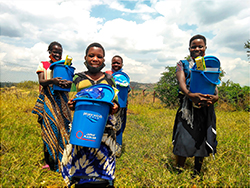
Female students receiving Menstrual Hygiene Management kits (Photo: Peace Winds Japan)
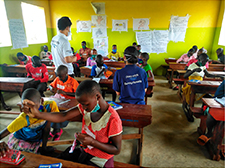
School Health Club students making reusable sanitary pads (Photo: Peace Winds Japan)
Note 1: This refers to those who originally live in the refugee-hosting areas.
Note 2: See the glossary regarding JPF.
Note 3: A place where female students can wash their bodies and clothes or change clothes during menstruation. It is also used as an office for female staff so that female students can use the space easily without worrying about being noticed. The place is also tailored to serve as a consulting space for menstrual hygiene.
Note 4: Due to the lockdown under the spread of COVID-19, the distribution was done through household visits.
Note 5: Reusable sanitary pads, underwear, laundry soap, and a bucket for school girls.
Note 6: See “ODA Topics” for TICAD.
■Peace and Stability
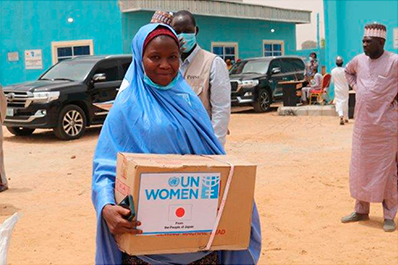
A woman in Nigeria receiving a sewing machine as part of a start-up kit after receiving training and lectures at a Women and Girls Entrepreneurship Development and Empowerment Hub established through grant aid (Photo: UN Women)
At TICAD 8, Japan expressed its commitment to support Africa’s own efforts to achieve peace and stability, which are required preconditions for economic growth, investment, and betterment of livelihoods, under the “New Approach for Peace and Stability in Africa (NAPSA).” Glossary
Peaceful and stable societies and sustainable growth can only be achieved under the rule of law. Japan provides cooperation to maintain and enhance the rule of law, including training for police officers and support for border control. In addition, Japan provides support for human resources development to build institutions and strengthen governance in the judicial and administrative sectors, for conducting fair and transparent elections, and for ensuring public security. To promote mutual understanding and cooperative relations between the government and people as the foundation of peace and stability, Japan supports collaboration between local government and communities.
In addition, Japan supports Africa’s own efforts for mediation and conflict prevention through strengthening the capacity of PKO personnel at Peacekeeping Training Centers in Africa and supporting the African Union (AU) and other regional organizations. Japan has provided support of over 110 million US dollars since 2008 to implement projects that have benefitted Peacekeeping Training Centers in 15 African countries. Japan has also dispatched approximately 60 Japanese lecturers to strengthen the training capabilities of the facilities and provided training at the facilities.
In the Sahel region, Japan contributes to the peace and stability of the region under the banner of NAPSA by providing equipment for strengthening capacity for maintaining security, training for people engaging in institution building, vocational training and education opportunities for the youth, as well as support for human resources development for peacekeeping operations, placing its focus on the administrative vulnerabilities of Sahel countries. For example, to help stabilize the Sahel region, Japan implements measures to improve public services, such as the support through the United Nations Development Programme (UNDP) for residents of the Liptako-Gourma region, Note 33 and thereby contributes to the strengthening of community bases.
Since the independence of South Sudan in 2011, Japan has supported its nation-building. Currently Self-Defense Forces personnel are deployed to the headquarters of the United Nations Mission in the Republic of South Sudan (UNMISS) as its staff officers. Japan also supports South Sudan’s own initiatives for the peace process including through the Intergovernmental Authority on Development (IGAD), a regional organization of East Africa. Along with the support for infrastructure development, human resources development, and food assistance, Japan plays a major role in the consolidation of peace and economic stabilization in South Sudan.
Moreover, Japan supports the holding of the “National Unity Day” sports event, which is held annually by the Ministry of Youth and Sports of South Sudan, since it began in 2016 in order to promote the reconciliation, friendship, and unity of its citizens. The sixth event was held in March 2022, with the participation of 372 athletes under the age of 20 representing the whole country. In October 2022, as part of the “Project for Youth Empowerment through Sports for Peace Promotion,” a total of 14 persons from the Ministry of Youth and Sports, the Ministry of General Education and Instruction, and the South Sudan Athletics Federation, were invited to Japan for training including visits to the Japan Sports Agency and other administrative organizations and educational institutions. Through their experiences and exchanges of opinions at the places they visited, the participants reaffirmed the power of sports for reconciliation and human resources development. It is important that the international community continue to cooperate and support the consolidation of peace in South Sudan, so that the people of the country can feel secure due to the stabilization of peace and also ensure that conflicts will never be repeated.
Glossary
- Tokyo International Conference on African Development (TICAD)
- An international summit-level conference on African development launched by Japan in 1993. Co-hosted with the UN, UNDP, the World Bank, and the African Union Commission (AUC), it is a forum for African development to realize the principles of African “ownership” and international “partnership.” TICAD 8 was held in Tunisia in August 2022, with the participation of 48 African countries, including 20 heads of state and government.
- New Approach for Peace and Stability in Africa (NAPSA)
- The new approach advocated by Japan at TICAD 7 held in Yokohama in August 2019, under which Japan supports African-led conflict prevention, mediation, and intervention efforts by the African Union (AU) and regional economic communities (RECs); institution building and strengthening of governance; and prevention of youth radicalization and strengthening resilience of local communities, based on the principles of respecting Africa’s ownership and taking measures against root causes of conflict and terrorism.
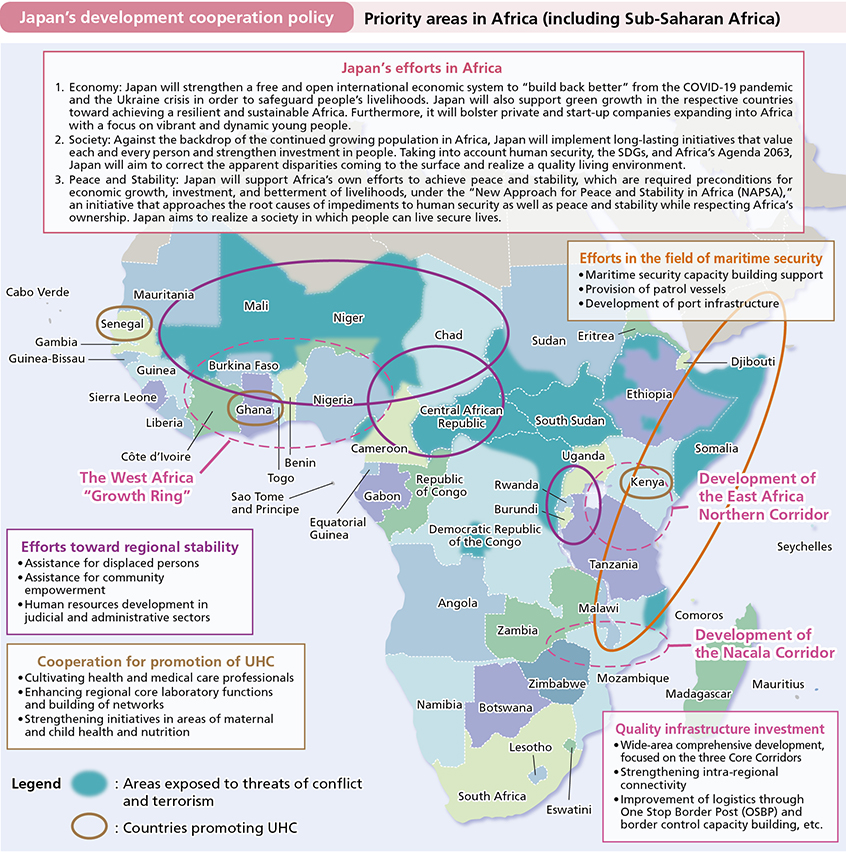
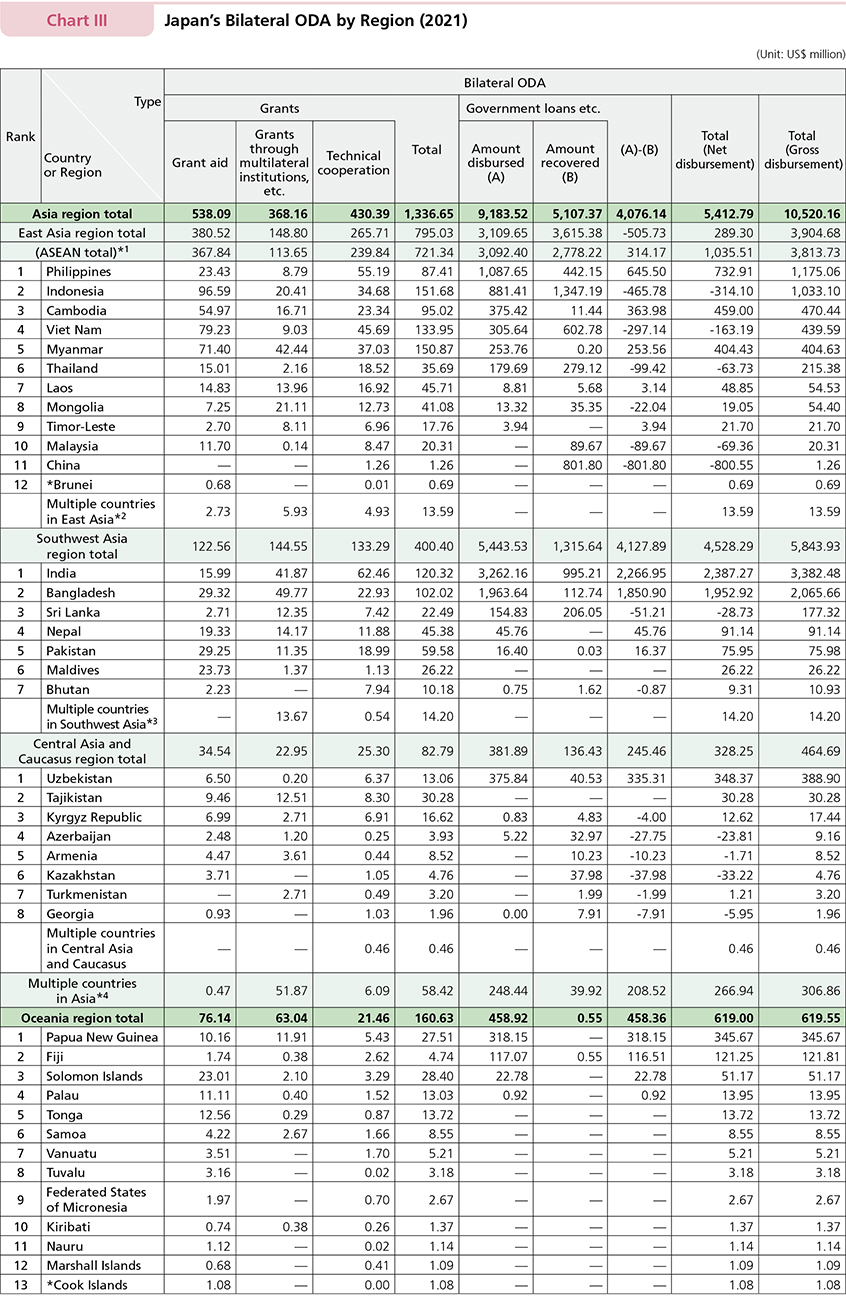
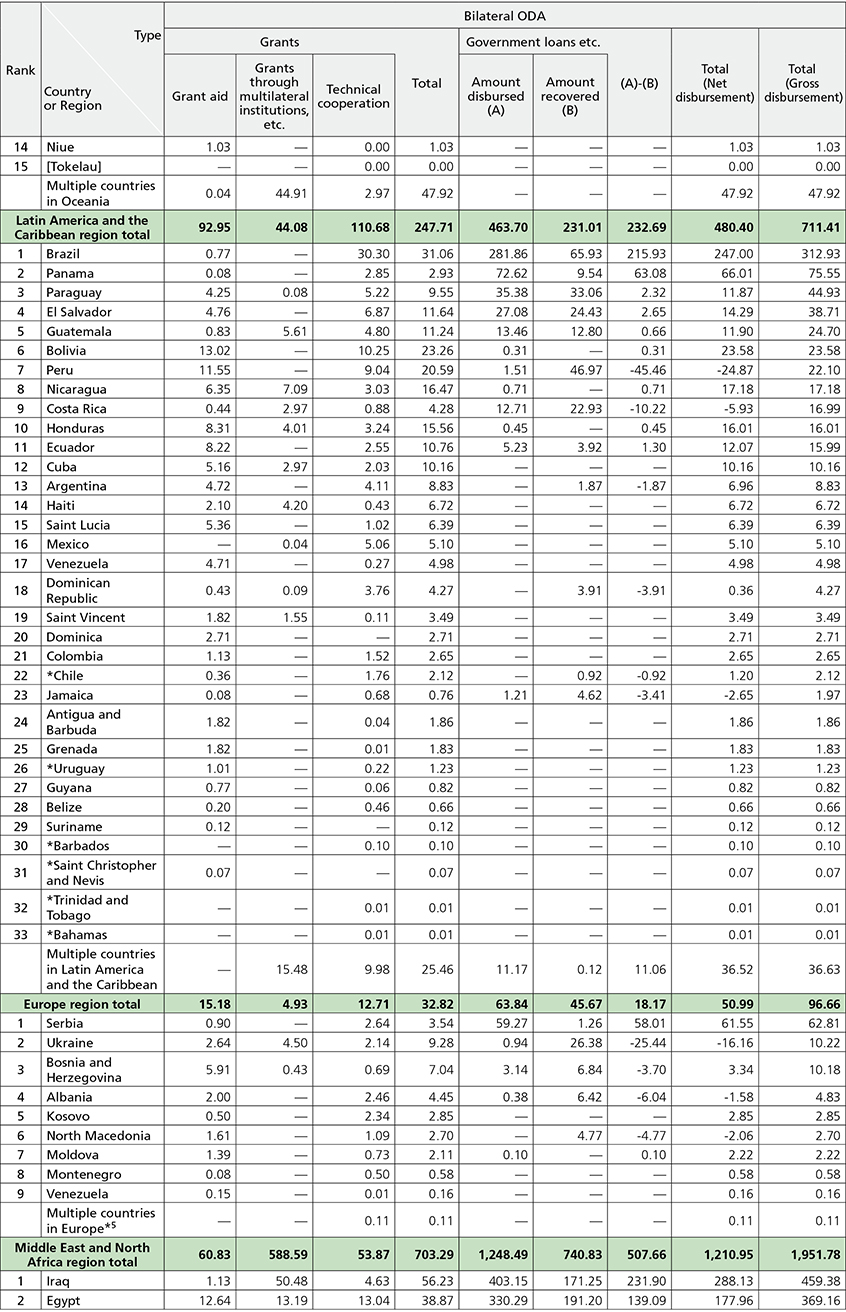
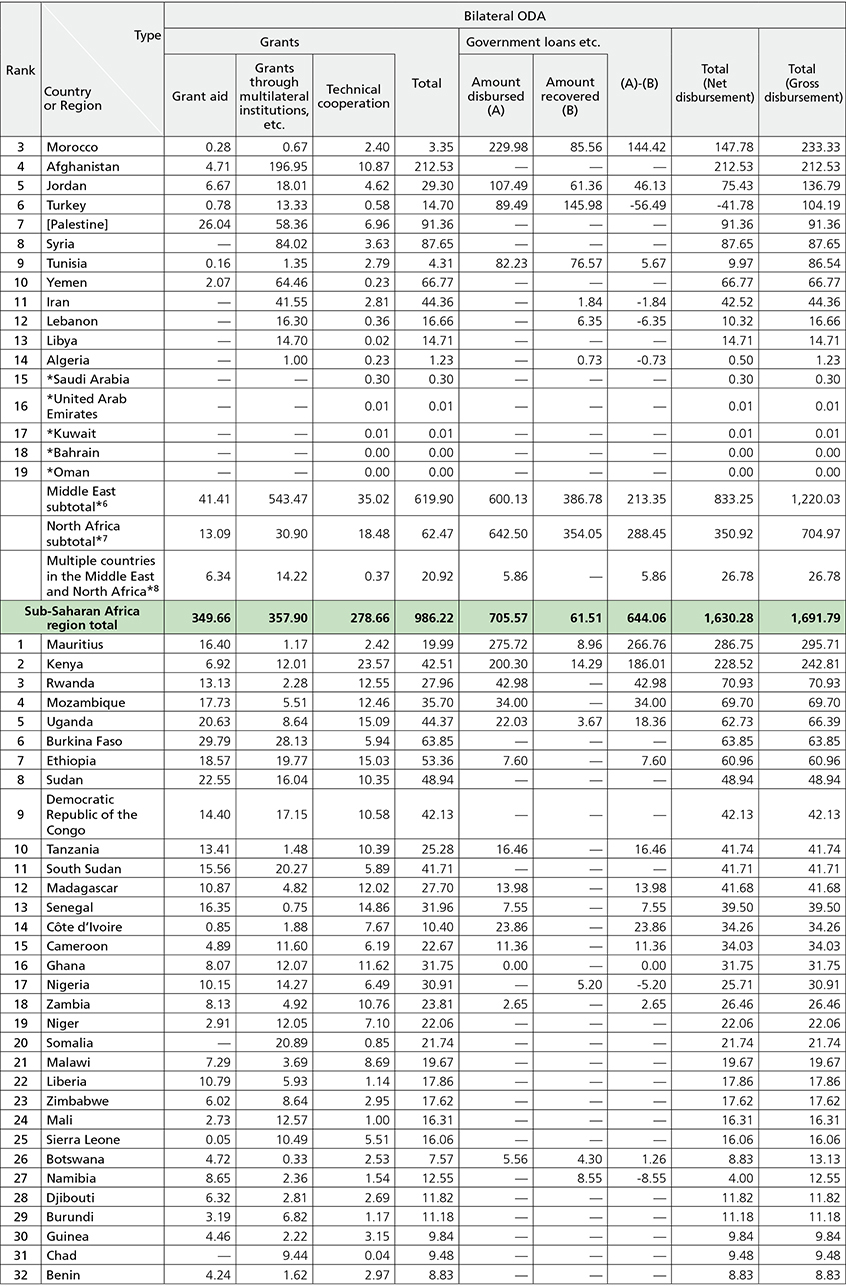
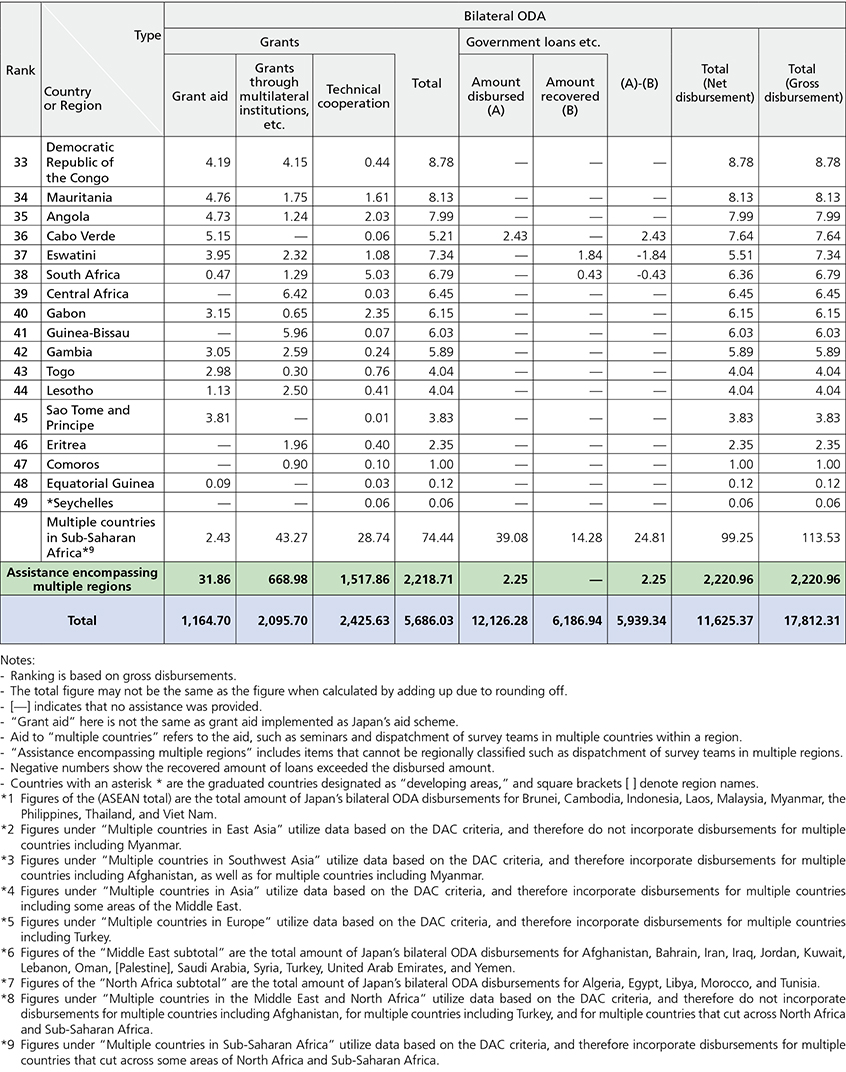
- Note 24: Adopted at the Ordinary Session of the Assembly of the African Union (AU) in 2015, the same year the “2030 Agenda for Sustainable Development” was adopted.
- Note 25: See the glossary.
- Note 26: See Note 33.
- Note 27: Three areas spanning the East Africa Northern Corridor, the Nacala Corridor, and the West Africa Growth Ring.
- Note 28: See the glossary.
- Note 29: See Note 54.
- Note 30: The seven countries are Tunisia, Uganda, Republic of Congo, Democratic Republic of the Congo, Benin, Malawi, and South Sudan.
- Note 31: See Note 65.
- Note 32: See the glossary.
- Note 33: A region bordering the three countries of Burkina Faso, Mali, and Niger, where terrorist attacks occur frequently.
